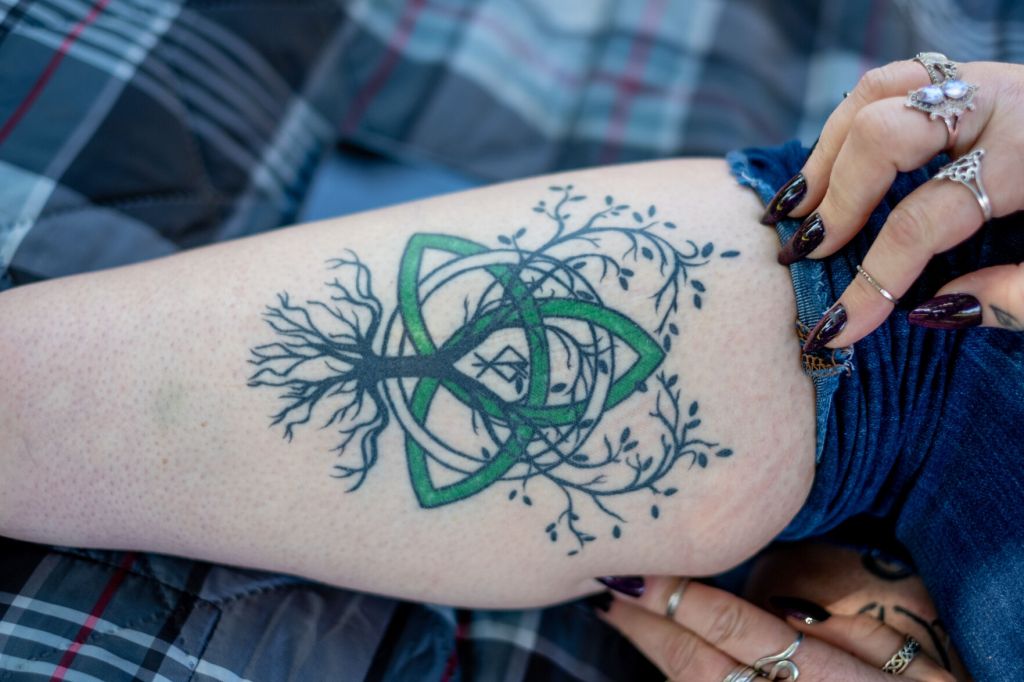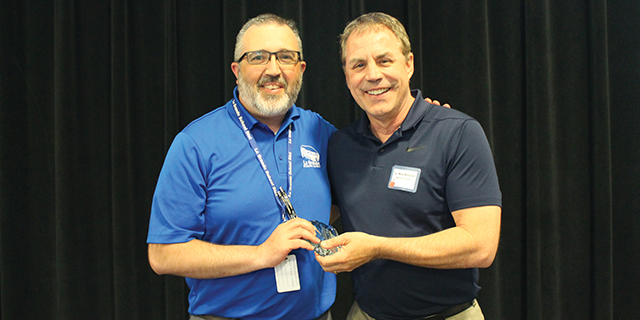Pendleton Pagans group provides spirituality outside mainstream
Published 5:00 pm Thursday, October 5, 2023

- Marie Hancock, founder of Pendleton Pagans, shows her triquetra tattoo — a symbol of the connectedness of all things — on Thursday, Sept. 14, 2023, at Community Park in Pendleton.
PENDLETON — Pendleton area residents looking for something outside mainstream religious paths may have group they can turn to.
The Pendleton Pagans welcomes people from various religions, backgrounds and spiritual beliefs. Marie Hancock founded the group two years ago after a conversation with another pagan about the lack of a group for pagans in the Pendleton area.
“I put out feelers on the different Facebook pages and whatnot,” Hancock said. “And people started to respond. Within a day, we had probably 150 members.”
As of Thursday, Sept. 14, the group has 229 members.
The group does not have a regular meeting time or location, but Hancock said they do celebrate numerous holidays throughout the year. There also is a Facebook group, where interested people can join to become a member after answering a short set of questions.
‘Working’ with deities
Hancock said she is a Christopagan, a broad term referring to the combining of Christian and pagan beliefs. For her, Christo refers to a belief in Jesus Christ. Although she is not Christian, she said she believes in many aspects of Christianity. She combines these aspects of Christianity with paganism for the term Christopagan. Hancock said she is monotheistic, meaning she worships one god but in very pagan ways.
She said she worships Jesus, honoring him and looking to follow his words and ways. However, she said she “works” with other deities, such as the Celtic goddess Brigid. Working with a deity is different from worshipping, she said.
As an example, Hancock said she has an altar for Brigid, which she does not have for Jesus. She could call on Brigid, the goddess of wells, waterways, fires, and healing and protector of mothers and children, to help her home feel warm. In this case she would place something the goddess likes on the altar out of respect, then Hancock would go do her best to make a warm, cozy home while she said the deity would do the same to achieve the end result.
“It’s like working with a friend, or a teacher in school,” Hancock said. “But not bowing a knee and being led by.”
She said many people disagree that one can be Christian as well as pagan or a witch, and many disagree that she can be monotheistic and pagan. However, she said the Pendleton Pagans is a group where there is no wrong way to believe.
Broad sets of beliefs
Like Christopaganism, Hancock said paganism itself is a broad term and can describe anything outside of mainstream religions such as Christianity, Judaism or Islam. Adam Haynes, an administrator for the group and an eclectic pagan, said paganism looks different for everyone.
“It’s a whole personalized path, really,” Haynes said, agreeing with Hancock that paganism can’t be pinned to one definition. “I mean, it’s kind of like you piece together what works for you.”
The personalized aspect of paganism is important to the group. There no one set of beliefs or holy texts that members follow. Hancock said there is no leader or pastor in the group, as they all learn from each other.
“One of the things that I like best about it,” Hancock said, “is that no one gets to tell you that you are doing it wrong.”
She, along with Haynes and his wife, Tiffany, said it would not be accurate to call paganism a religion. It is more like a customized spiritual path.
Tiffany Haynes, also a group administrator, said pagans can choose which deities to believe in or choose to follow none. One of the deities Tiffany Haynes works with is Hecate, a goddess from ancient Greek mythology, who she makes offerings to for protecting her home. Adam Haynes and Hancock work with Hecate as well.
Deities come from a wide variety of cultures and religions, including Greek, Roman, Egyptian and Norse. Adam Haynes said people have the flexibility to change which deities they embrace over time and pointed to Norse tattoos on his hands near a tattooed symbol of Hades, the God from ancient Greek religion and mythology.
“When you choose a deity, it’s not like you’re set in stone with them,” he said. “You work with them for what you need.”
Fighting against stereotypes
Hancock said while the group is called Pendleton Pagans, it has a strong focus on witchcraft. There is an important distinction related to witchcraft, she said, as it is not the same as paganism.
“Not all pagans are witches, not all witches are pagans,” she said.
Hancock said there are harmful and false stereotypes about witches conveyed by the Christian church, such as having a green face and eating children. She said the stereotype about witches having a green face came out of the Salem witch trials, referred to as “the burning times” by witches, where people were beaten to the point of having greenish bruises.
Witchcraft is about intention, the three said, such as the intention to cure a sore throat with peppermint tea or to purify a home. All three practice witchcraft, although in different ways.
Tiffany Haynes is an eclectic witch with an emphasis on kitchen witchcraft. She said she puts out intentions, such as purifying her house, through cooking.
“I’ll make a meal based on the needs of what I wanted to put an intention out on,” Haynes said. “And in that way, I eat it and my intention and energy flow is together.”
Hancock explained witchcraft can be practiced by people of various religious beliefs.
“A witch can be Christian, and people have a problem with that from a lot of different angles,” she said. “A witch can be Muslim, or a witch can be Jewish. They can all be a part of the Abrahamic religions.”
Group offers respite from religious trauma
There is a wrong interpretation of what a witch is by the Christian churches, Hancock said, that contributes to religious trauma.
If a church teaches a gay child that his orientation is wrong and sinful, he could internalize the belief he is a bad person for being gay, she said, and that’s an example of religious trauma. Hancock said many members of the group have religious trauma and came to the group looking for a sense of spirituality after being rejected by a church.
She said one group member left their church because the church asked them to choose between their lifelong devotion to Christianity and continuing to be the parent of a transgender child.
Hancock said the Pendleton Pagans group does not care about gender, race or sexual orientation. The group is based on love, support and respect.
“What we do is we love,” Hancock said. “We love, we embrace and we put that in to action.”





